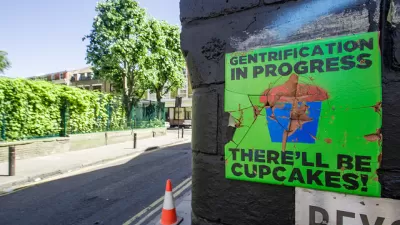Zócalo Public Square Editor Joe Mathews takes aim at the phrase, “We want to protect the character of the community," calling it a lousy argument in normal times and verging on "treasonous" due to climate change and California's housing crisis.

"The expressed desire to defend community character is a staple of California conversations," writes Mathews.
It’s routinely aimed at developers, planners or anyone with a big, transformational vision. But in a state struggling to keep up with changes in housing, economy and environment, there may be no more damaging set of words.
Planetizen has no tag for "community character," but has 22 posts tagged "neighborhood character." What's intriguing about Mathews' column is his observation that "protecting community character" is used by a wide array of interests.
The defense is most often, but not exclusively, expressed by homeowners and their groups to oppose housing projects that add unwanted density, even if not in their own single-family neighborhoods, as New York Times "Upshot" columnist Emily Badger reported last January (via Planetizen, "The Rise of the NIMBY Movement, and How Homeowners Came to Own the Whole Neighborhood"):
Common among these opposition campaigns is a conviction "that owning a parcel of land gives them a right to shape the world beyond its boundaries," according to Badger, who traces the roots of the idea that the influence of property owners should reach well beyond the property line.
It is also "used by poor people protesting gentrification that might bring richer people to their neighborhoods," observes Mathews, although he doesn't provide examples.
The proposed residential building moratorium in the gentrifying Mission District of San Francisco in 2015 comes to mind, meant to prevent displacement in the largely Latino neighborhood. Many residents want the moratorium campaign extended to bikeshare stations, which have "recently become a source of scorn from anti-gentrification advocates."
Mathews doesn't take on historical and cultural applications of protecting neighborhood character, although it's difficult to think why he would make them an exception.
Beyond housing
"As bad as today’s housing crisis is, it pales in comparison to the dangers that the community protection racket poses for California’s future," adds Mathews.
The threat of climate change, in particular, will require transformation in how and where we live, which by definition will change community character. And the state needs to invest on an enormous scale in transit so that we drive less and burn fewer fossil fuels. No responsible community in California should stay the same in such a time.
Proposition 13
For 40 years now, since the passage of Proposition 13, California has prioritized community stability — holding down property taxes to benefit existing homeowners and businesses — at the expense of schools, health care, business development and local services. It’s time for that era to end.
But that will require that we stop singing the praises of community character and start realizing that it’s really the anthem of California’s religion of obstruction.
Mathews began his passionate column by asking readers to adopt a New Year's resolution: "[F]or the good of your state, the best thing you could do is swear off this phrase: 'We want to protect the character of the community,'" and ends with:
And if your fellow Californians still persist in claiming they want to “protect the character of our community,” please feel free to start questioning their character.
FULL STORY: Resistance to development stands in way of prosperity

Study: Maui’s Plan to Convert Vacation Rentals to Long-Term Housing Could Cause Nearly $1 Billion Economic Loss
The plan would reduce visitor accommodation by 25% resulting in 1,900 jobs lost.

Alabama: Trump Terminates Settlements for Black Communities Harmed By Raw Sewage
Trump deemed the landmark civil rights agreement “illegal DEI and environmental justice policy.”

Why Should We Subsidize Public Transportation?
Many public transit agencies face financial stress due to rising costs, declining fare revenue, and declining subsidies. Transit advocates must provide a strong business case for increasing public transit funding.

Paris Bike Boom Leads to Steep Drop in Air Pollution
The French city’s air quality has improved dramatically in the past 20 years, coinciding with a growth in cycling.

Why Housing Costs More to Build in California Than in Texas
Hard costs like labor and materials combined with ‘soft’ costs such as permitting make building in the San Francisco Bay Area almost three times as costly as in Texas cities.

San Diego County Sees a Rise in Urban Coyotes
San Diego County experiences a rise in urban coyotes, as sightings become prevalent throughout its urban neighbourhoods and surrounding areas.
Urban Design for Planners 1: Software Tools
This six-course series explores essential urban design concepts using open source software and equips planners with the tools they need to participate fully in the urban design process.
Planning for Universal Design
Learn the tools for implementing Universal Design in planning regulations.
Smith Gee Studio
Alamo Area Metropolitan Planning Organization
City of Santa Clarita
Institute for Housing and Urban Development Studies (IHS)
City of Grandview
Harvard GSD Executive Education
Toledo-Lucas County Plan Commissions
Salt Lake City
NYU Wagner Graduate School of Public Service





























